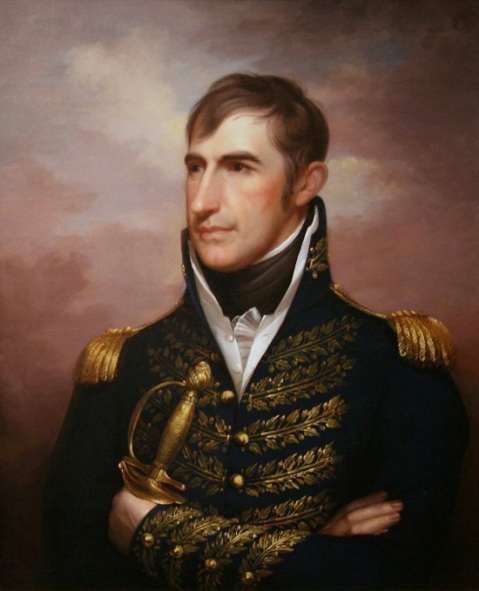American frontiersman, field commander, politician, and president. Born on his father’s plantation, Berkeley, in Charles City County, Virginia, on 9 February 1773, Harrison graduated from Hampden-Sidney College in 1790. His father, Benjamin Harrison, a signer of the Declaration of Independence and the governor of Virginia from 1782 to 1784, sent him to Philadelphia to study medicine under Benjamin Rush. When his father died in 1791, Harrison immediately abandoned medicine and received an ensign’s commission in the 1st Infantry, which was stationed in Ohio with standing orders to patrol the Northwest Territory.
As lieutenant and aide-de-camp to “Mad Anthony” Wayne, Harrison fought with distinction at Fallen Timbers on 20 August 1794. Promoted to captain in 1797, he commanded Fort Washington, near Cincinnati, until he resigned in 1798 to become territorial secretary for the Northwest. He was territorial delegate to Congress in 1799 and governor of the newly created Indiana Territory from 1800 to 1812. A significant part of his duties was to maintain good relations with the natives of the territory and thus ensure safety for white settlers. He undercut his own efforts at peace by forcing a series of land-grabbing treaties on the Shawnee and other indigenous nations. Tecumseh and his brother, Tenskwatawa, organized native resistance against Harrison’s policies.
On 7 November 1811, at the confluence of Tippecanoe Creek and the Wabash River, Harrison defeated Tenskwatawa and burned his village, losing about 180 of the 950 regulars and militia under his command. This battle destroyed the fragile coalition of natives in Indiana and made Harrison a national military hero with the nickname “Tippecanoe.” Tecumseh led the remnants of the tribes into Canada, where they became staunch allies of the British during the War of 1812.
Appointed major general of the Kentucky militia in August 1812, Harrison relieved Fort Wayne and was commissioned brigadier general of regulars in September. Seeking to recoup the losses suffered by James Winchester in the west, Harrison built Fort Meigs and Fort Stephenson in Ohio and waited for reinforcements. Promoted to major general of regulars in March 1813, he marched north that autumn, recapturing Detroit on 29 September and decisively defeating the British and Indians at the Thames on 5 October. His nemesis, Tecumseh, was killed in that battle. He resigned his commission in May 1814 and returned to Ohio.
Harrison represented Ohio in Congress from 1816 to 1819 and in the Senate from 1825 to 1828. He lost a four-way election for president to Martin Van Buren in 1836, but won the White House as a Whig in 1840. He died on 4 April 1841 from the pneumonia he caught while delivering his inaugural address a month earlier, the first American president to die in office.
References and further reading: Cleaves, Freeman. Old Tippecanoe: William Henry Harrison and His Time. Newtown, CT. American Political Biography Press, 1990. Goebel, Dorothy Burne. William Henry Harrison: A Political Biography. Philadelphia, PA: Porcupine, 1974. Green, James A. William Henry Harrison: His Life and Times. Richmond, VA: Garrett & Massie, 1941. Todd, Charles Stewart, and Benjamin Drake. Sketches of the Civil and Military Services of William Henry Harrison. New York: Arno, 1975. Young, Stanley. Tippecanoe and Tyler Too! New York: Random House, 1957.
